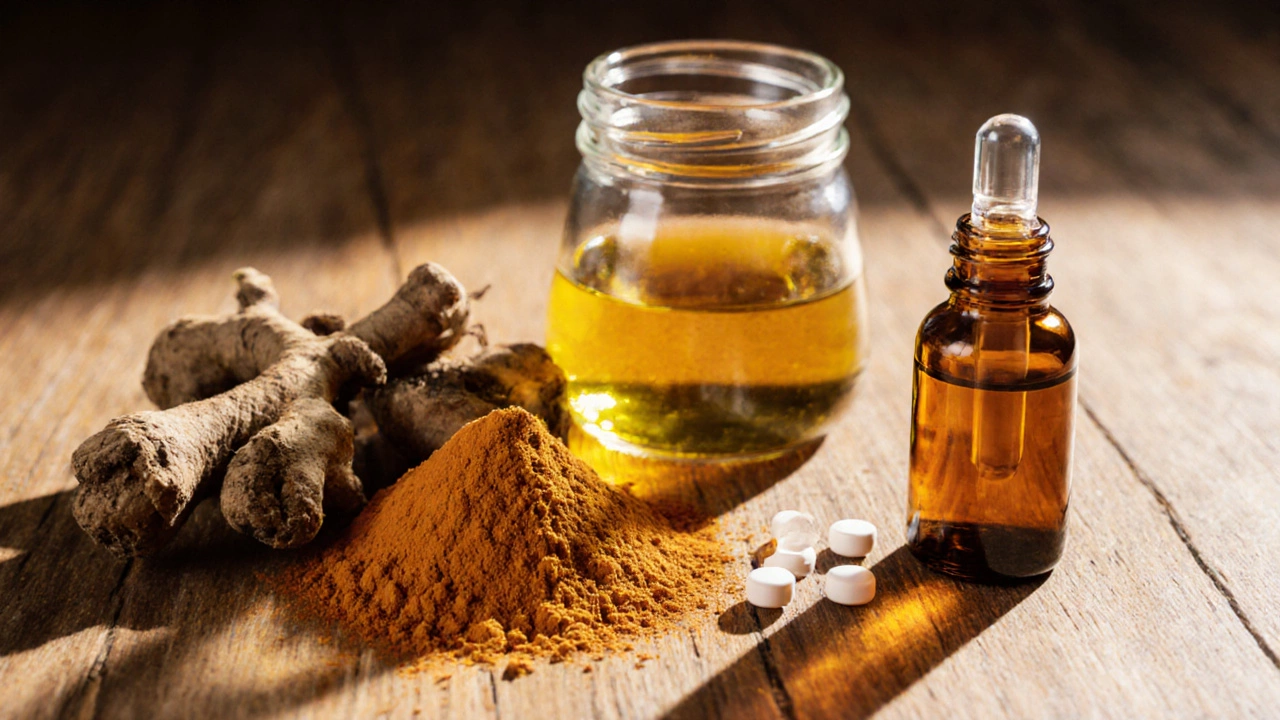Ayurvedic Medicine: What You Need to Know Before You Try It
Ayurveda has been part of Indian health traditions for thousands of years, and many people turn to it for natural relief. But the popularity of herbal pills, oils, and powders doesn’t automatically mean they are safe for everybody. In this guide we break down the basics, point out the hidden dangers, and give you practical tips to use Ayurvedic products responsibly.
What is Ayurvedic Medicine?
Ayurvedic medicine is a system that balances three energies, called doshas, with diet, lifestyle, and plant‑based remedies. The most common herbs you’ll see are ashwagandha, turmeric, neem, and giloy. Practitioners match a person’s dosha type to specific herbs and recommend daily routines called "dinacharya" to keep the body in sync.
Modern researchers have started testing many of these herbs. Some, like turmeric’s curcumin, show real anti‑inflammatory effects. Others, such as certain Ayurvedic metals (lead, mercury, arsenic), are added in tiny amounts to boost potency. Those metal‑based preparations can be dangerous if not manufactured under strict quality control.
Safety Tips and Toxicity Concerns
First, always check the source. Reputable brands list the exact botanical name, concentration, and manufacturing standards. Avoid products that claim “100% natural” without a lab report; natural does not equal risk‑free.
Second, look out for heavy‑metal contamination. The Indian Pharmacopoeia sets limits for lead, mercury, and arsenic, but many small manufacturers skip testing. If a product smells metallic or looks unusually dark, it’s a red flag.
Third, know your health conditions. People with liver disease, pregnancy, or thyroid problems should talk to a doctor before taking herbs like ashwagandha or guggul, which can affect hormone levels.
Fourth, start low. A common mistake is to jump straight to high doses because the label says “take 2 capsules daily.” Begin with half the recommended amount, monitor how you feel for a week, then adjust if needed.
Lastly, store herbs properly. Moisture, heat, and light break down active compounds and can promote mold growth, leading to gastrointestinal upset.
By following these simple steps—checking the brand, watching for metals, consulting a professional, starting slow, and storing correctly—you can enjoy many of Ayurveda’s benefits while keeping the hidden risks at bay.
Remember, Ayurveda works best when it’s part of a balanced lifestyle that includes a varied diet, regular movement, and adequate sleep. When you combine these habits with carefully chosen herbal supplements, you’re more likely to see real improvements without unwanted side effects.
If you ever feel dizziness, nausea, or a rash after starting an Ayurvedic product, stop using it and seek medical advice. Early detection of a reaction can prevent more serious health problems.
Overall, Ayurvedic medicine offers a rich toolbox for natural health, but it’s not a free‑pass to ignore safety. Use the information above to make informed choices, and you’ll get the most out of this ancient system while protecting your well‑being.

What Is the Difference Between Homeopathy and Ayurveda?
Homeopathy and Ayurveda are both traditional healing systems, but they differ in theory, practice, and science. Ayurveda uses herbs and lifestyle changes based on body types; homeopathy relies on extreme dilutions with no proven effect. Know which one suits your needs.

Is Ayurveda Good or Bad for You? The Real Facts Behind the Ancient Healing System
Ayurveda can help with stress, digestion, and chronic pain - but it also carries risks like heavy metal poisoning and dangerous herb interactions. Learn what works, what doesn't, and how to use it safely.

Can I Take Ayurvedic and Homeopathic Medicines Together? Safety Guide
Learn if Ayurvedic and homeopathic medicines can be safely combined, understand potential interactions, and get a step‑by‑step guide for safe use.

Ayurvedic Medicine: What Is It Really For?
Ayurvedic medicine is an ancient way of healing from India that looks at health in a totally different way than modern medicine. It uses herbs, diet, lifestyle changes, and body treatments like massage to prevent and manage illness. The main idea is to find balance in your body and mind, based on your unique constitution or 'dosha'. This article covers what Ayurvedic medicine is for, common uses, and helpful tips to get started. It's a practical guide for anyone curious about natural ways to stay healthy.

Can We Drink Coffee While Taking Ayurvedic Medicine? What You Need to Know
Ever wondered if your love for coffee clashes with Ayurvedic medicine? This article breaks down how coffee may interact with herbs, what Ayurveda has to say about caffeine, and when it's safe or risky to mix the two. Get tips from everyday habits and learn how timing, personal constitution, and lifestyle choices play a big role. Don’t miss practical advice to make sure your morning brew doesn’t ruin your wellness journey. Clear, actionable info—no fluff, all facts.

Unveiling the Characteristics of a Pitta Person: Traits and Tips
Discover the unique traits of a Pitta person as defined in Ayurveda. Learn how their fiery nature influences their personality, lifestyle, and health. Practical tips for maintaining balance are included. Understand how diet, exercise, and mindset can help manage Pitta traits. Dive into the world of Ayurveda for better self-awareness and well-being.

Understanding the Vata Dosha: Characteristics and Lifestyle Tips
In Ayurvedic medicine, 'Vata' is one of the three doshas, often associated with air and space elements. People with a predominant Vata dosha are typically characterized by their enthusiasm, creativity, and quick thinking. However, they may also experience imbalances like restlessness and anxiety. Understanding these traits can help create a lifestyle that maintains Vata balance through diet, exercise, and daily routines. This article explores the core characteristics of Vata individuals and offers practical tips for maintaining harmony.

Effective Ways to Lose Belly Fat in Just 2 Weeks
Oct, 10 2025



